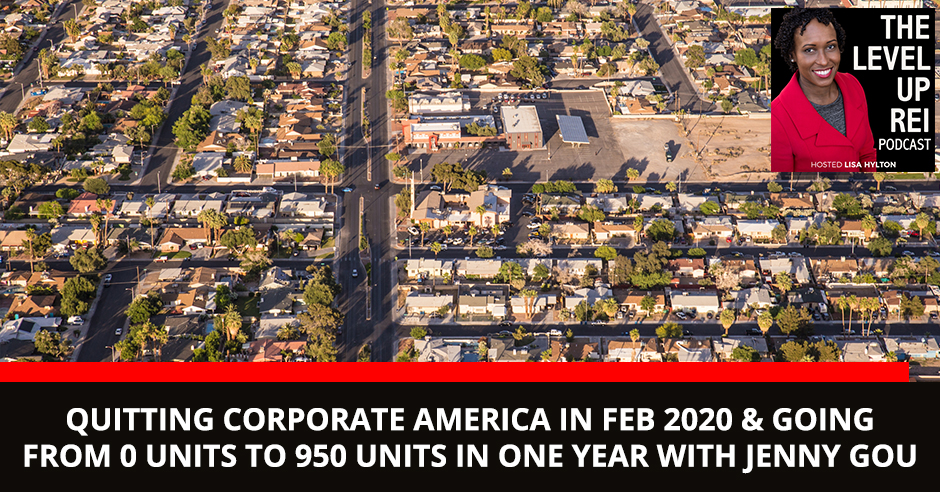
Quitting your corporate job in America is a dream many have, but few get to follow up on. In this day and age of COVID-19, it has become even more of a challenge. However, Lisa Hylton talks to someone who did just that: Jenny Gou, Founder and Managing Director at Vertical Street Ventures. Jenny talks about her journey from corporate worker to full-time real estate investor and asset manager. Jenny shares her insights on what you need to do to become successful in the real estate space and why multi-family homes are the way to go.
—
Watch the episode here
Listen to the podcast here
Quitting Corporate America In Feb 2020 & Going From 0 Units To 950 Units In One Year With Jenny Gou
Welcome back to another episode. I am super excited to have on the show, Jenny Gou. Jenny is a Managing Partner at Vertical Street Ventures, which was established to help individuals achieve their financial goals through passively investing in real estate. As one of the founders, she oversees asset management and investor relations. She focuses on business strategy and execution of the business plan as well as managing relationships and communications with investors. Jenny has acquired a portfolio of over 950 units across Arizona, Texas, and Georgia.
Prior to becoming a full-time operator and investor, Jenny was a Sales Director at Procter and Gamble for 13 years, working on brands like Dawn, Cascade, and Swiffer. She managed cross functional teams on top accounts, which included Costco, Walmart, Target and more. Her overall experience in leading team’s strategy and project management enables Vertical Street Ventures to be the best in the industry and make our communities a better place to live. Jenny graduated from the University of Arizona with a degree in Business Management and received her MBA from the University of Minnesota. She’s married to her husband, Ronnie, and they have two and a half kids, a fur one included. Welcome to the show, Jenny. I’m so happy to have you.
Thanks, Lisa. I’m super excited to be here.
This episode is going to be about quitting the corporate world and building an entrepreneurial business through real estate investing as a result of it. I’m excited to have you on to talk about this. For me, I have left the corporate world myself. Before we started, we were talking about all the different things that you have to start to consider, that you don’t necessarily think about even the mindset shifts that are required to make this happen. Before we get started in the interview, my interviews are generally broken up into three parts. I have background, then we get into the meat and then we do a wrap up with my level of questions. A little bit of background, we know where you live. I mentioned that. I know that you live in California. Can you share with my audience something that you and your family like to do for fun?

Quitting Corporate America: You’re essentially married to your partners. So if you’re going to partner with somebody, make sure you do the diligence.
I do get to live in sunny Southern California. I’m enjoying this beautiful weather. We love to explore and do new things. We’ll go to the aquarium. We’ll find new parks around the city. There are so many available around us here. We try to take advantage of those whenever we can.
California, because of the beautiful weather, you can live outdoors and have just an amazing outdoor experience year-round, which is so good. To get started in this episode, can you share with my readers when you decided to transition from Corporate America into entrepreneurship?
It was a journey. As with any of your readers, and I’m sure yourself, we grew up thinking there was a certain way to live our life. Do well in school, get good grades, go to a good school, college, get a good corporate paying job, save, retire, put your money in 401(k) or your IRA funds, buy a house, have two and a half kids, which I ended up doing and then retire at 65. That was it. My husband and I, we were on the same journey. We quickly realized after having kids that we didn’t want to work until we’re 65. We said, “What is a way that we could generate some passive income?” After reading some blogs, we said, “Real estate is probably our best bet.” We started investing in single-family homes first, all in the Midwest when we live there, and then afterwards, we accumulated up to ten.
Afterwards, I think it was a lightbulb moment for us where we said, “How do we scale this even faster?” We started learning about multifamily. From there, we learned the model. I believed in it so much that I quit my job before buying a single multifamily unit, which is scary, but because we had that passive income accumulated from our single-families, it allowed me to do that earlier than expected. We said, “Jenny, you jump ship and go do this full-time. You don’t have to work, but you can if you want to, that’s the freedom.” My husband stayed and is still working at P&G.
Once you overcome that first deal, everything else just falls in place. Share on XCan you talk a little bit about the breaking point, or maybe the pivotal point at which you and your husband saw that maybe it’s best for one of us to double down on building a business in the real estate space?
It really was a family circumstance that made us stop, pause, and reprioritize. It had to do with a family health issue, which is why we decided to move back to California to be closer to family. At that time, we said, “What’s really important with our life and our time, given the short time we’re here on Earth, we want to just have more flexibility.” It’s because of that pivotal mind shift change of how we want to spend our time, we said, “Why wait?” There’s never a good time to do anything. Yesterday was probably the best time. “Why wait? Let’s just have you leave and focus on the kids, the business side of real estate, and then double down.” When we sat down and did the math, we said, “We can acquire more quickly, and have more generational wealth that we can pass on to the kids if we focus more of our time on real estate versus our corporate, W-2 job.”
That’s just by doing the numbers of like acquiring properties, and etc. Connected to that, you did that in 2020. You have 950 doors. Can you talk about a couple of the things that were most pivotal in helping you build this business?
I would say looking back now, I think the three things that really accelerated my portfolio was one, having that basic foundation of real estate in multifamily specifically. We read a ton of books, listened to a bunch of podcasts, attended a bunch of meetups, pre-COVID in person, virtually when all that went down. You have to be a learner and invest your time and energy into educating yourself. The second thing I did was I found a mentor. It’s like being an intern for a company. No better way to quickly learn than being under somebody’s wing to get their knowledge, to get their experience quicker, versus doing it yourself, and then taking action.
This is the one thing I think a lot of people struggle with is they can spend months and years learning, but that does absolutely no good until you make the leap and take action. The first deal is always the hardest. The ones afterwards come naturally and come quickly. That even started on the single-family side. We were really nervous about our first single-family rental. Afterwards, we’re like, “That was not as overwhelming. A lot easier than we thought.” In fact, we closed on four in one day. It was mind blowing. Once you overcome that first step, everything else falls in place. It’s so great.
Connected to that single-family, do you still have that portfolio now?
Yes, we still have it. We still have ten single-families. There’s still great cashflowing there in the Midwest. Amazingly, just since 2020, they’ve also appreciated a ton because people are moving to these Midwestern states. They’re doing both well on both fronts. A lot of people ask me, “Would you still keep them or would you have started or done something differently?” As much as I love my single-family homes, knowing what I know now, go back in time, I would probably skip them all together, and jump straight into multifamily.
What makes you say that?
It’s the scalability. If you talk to anybody in this industry, they’ll say the same thing. People who have done this, 20, 30 years, it depends on your goal. To grow faster, and be scalable, you have to go up a number of doors. It takes a lot more time and effort and resources to manage ten single roofs than it does to manage ten units under the same roof. It’s not that much more work to manage an apartment building, the things that go with it versus single-family homes.
From that, I want to capture a couple of other topics here. Number one is the mindset shift. Going back a little bit to quitting the corporate world back in 2020, in the middle of COVID, because I think you left in February or March of 2020. A lot of people would just not do that. The uncertainty at that time was like super-duper high. Can you talk about the mindset that you needed to have to make this decision?
Looking back, it was definitely like what were you thinking, but glad I did that thing. I put my notice in early February 2020, roughly. My last day was towards the end of February, the week after California shut down. In early March, things shut down. The kids were pulled from school. I believe everything happens for a reason. Our jobs in the corporate world were really tough and time consuming. If I had still been working, I don’t know how I would have managed two kids at home on virtual school. It was a blessing that I left to help the kids with school, manage them, keep them from tearing each other apart. I wouldn’t have been able to do that if both of us were still working.
At the same time, we were remodeling our house, and we had just moved in before it shut down. That was also a blessing to get things figured out, to give me a couple of weeks to sort things out and deal with things being locked down. It also gave me time to reevaluate how I was going to spend my time. What I pictured my retired life to be didn’t end up looking that way because of COVID, but it caused me to sit down, reevaluate how I was going to spend my time. To prioritize the family, really think through, how was I going to accelerate in this real estate world, this new world I’m jumping into, when there seemed to be so many obstacles that were coming my way.

Quitting Corporate America: The key to success and acceleration is to make sure you have spent the time to set up your structure and your systems from the get-go.
That brings me to my next topic, teamwork. Can you talk about how important teams have been in helping you build your business?
This industry, you’ve heard this, I’m sure your readers have heard this, it is a team sport. Can you do it yourself? Absolutely, you could do it yourself. You probably will last a month, live a really unhealthy lifestyle and be super unhappy because there are so many different facets to the industry. It’s like working in a company. Either you’re sales or you’re finance or you’re logistics. You’re not a one all person. There’s no way that you can be in this industry. You heavily rely on your team. That’s why I partnered with my former mentor to start Vertical Street. We’ve added on Randy, who’s a ton of help on our underwriting because we are so time strapped as it is, as a startup, to do everything. We do multiple hats, and we have to do it well. Your team doesn’t stop there. Your team includes finding the right property management, finding the right broker, the lender, your investors are part of your team. It’s so much broader than you and your core and the company you work with.
What would you say to someone, as entrepreneurs and business owners, as they think about building their teams? What advice would you give to them as they think about partnering and then hiring?
You’re essentially married to your partners. First and foremost, if you’re going to partner with somebody, make sure you do the diligence. Steve and I, for example, we essentially spent the better part of 2020 interviewing each other, prior to doing our first deal. I helped him with a bunch of properties he managed in Arizona. He learned how I operated. I learned how he operated. We learned about our family and our kids. His daughters babysat mine. We got really pretty close in terms of understanding our values and our styles before partnering. I would also say, for better for worse, do a background check on the person you plan on working with because with your partner, closely, you will be sharing not just your details personally but your financial details.
You’re going to know their social, their net worth, their bank accounts. All of this stuff that you’re going to have access to, and you be darn sure they don’t have a criminal record or something in the closet. From a hiring standpoint, coming from the corporate world, it is super important to know everybody’s strengths and weaknesses. I’m a big fan of things like StrengthsFinder to understand what they can contribute well, so that you can find people that compliment you. You hear this all the time. A lot of CEOs, their right hand person, that’s the COO. They have to compliment you very well because you don’t want two people doing the same thing, or two likeminded people too much, because that could cause some tension as well. You just find a well-rounded team using those tools that’s available out there.
You need a mentor earlier on in your journey than later. Share on XHave you done the StrengthsFinder? What have been your strengths?
Yes. I found that it changes every couple of years. I don’t know why. I think it’s as you mature, you develop different things better. Lately, my top five is achiever, learner, harmony, input, and responsibility.
Did you do the StrengthsFinder when you were in corporate America as well?
Yes. That’s when I was first introduced to it.
That helped you in terms of hiring, considering who you were to hire and who would work best for your teams?
Absolutely. People want to do work that they’re good at and be recognized for that. You want to make sure you find the right people who are filling the right roles correctly.
Coming back to the topic of quitting the corporate world and going into entrepreneurship, can you talk about a little bit, you did mention that you had your ten properties. I wanted to reiterate on how real estate has helped you and how you could see it helping other business owners and entrepreneurs as they think about investing in real estate. How could it help them as they’re building their business that might not be in the real estate space?
Nothing is concrete or for sure in this world. The great thing about real estate is that everybody needs a roof over their heads. It’s one of the safer investments that will give you passive income. I go back to always, what are your priorities and what are your goals? If you’re someone who loves their job and never wants to quit and will do it for free. Bless you, you found your calling. That’s awesome. You also want to have that extra income on the side, real estate investing can be that for you because you’re so busy with your job that you love. You may or may not have a family that you want to spend time with. You don’t want to be doing extra work and trade money for time on something you don’t enjoy.
The real estate investing is a great avenue for you to not do anything. It’s like that chicken rotisserie, set it and forget it. I always quote that. It’s a way to give somebody your hard-earned money. Let them grow it for you. You set it and forget it. You don’t have to do a single thing. If you want to be truly passive, that is the ideal world where you get money coming in every month, whether it’s directly to your bank or on a check and you don’t have to do a single thing.
You also mentioned in this episode about mentorship. Once again, as business owners and entrepreneurs, as they think about continuing to build and expand in your business, can you talk a little bit about identifying when you think you do need to get a mentor involved? Probably some of the best ways to utilize a mentor and helping you build your business.

Quitting Corporate America: There’s no better way to quickly learn than being under somebody’s wing and getting their knowledge and experience quicker versus doing it yourself and then taking action.
I would say you need a mentor earlier on in your journey than later. I could talk about mentors for hours but in a nutshell, step one would be learn the fundamentals. What are the basics of the industry? In this case, real estate. What are the basics, the terms, the language that you should know? Learn that through the education piece, and then find yourself a mentor that you can add value to. The last thing you want to do is find somebody that you saw speaking at somewhere, and you say, “Lisa, I would love to learn about real estate. What is multifamily?” That’s the worst thing you could do.
Learn about the basics, learn your strengths, learn what their weaknesses are, and then complement that with what you could help them with. In my case, for example, Steve was still working full-time in his corporate job. He wasn’t able to get into the details in the weeds of operating an apartment. I had now retired. I got more free time. I said, “I have corporate experience in project management. I can run a team. Let me manage it for you since you’re still super busy.” How can they say no to that? Find a mentor earlier on if you want to accelerate your learning into the business.
What would you say are some of the key places that you found were helpful in finding mentors for the real estate space, because every space would be different?
There are so many great meetups out there. I found Steve, my mentor now, through a meetup that my husband went to, where Steve was speaking all these virtual conferences. Now that some things are opening up live, a lot of these big apartment guru mentors have these weekend events that you can meet a ton of people at. The key thing is just networking, so that you find somebody that you kind of connect to right off the bat.
The last item on this is tools and hacks that you have found helpful in your business that you could share with other business owners and entrepreneurs.
We started Vertical Street earlier in 2021. I’ve read this many times in other books too. The key to success and acceleration is to make sure you spent the time to set up your structure and your systems from the get-go. What we did was, and I love the systems we have, we set up a CRM. We use ActiveCampaign, that is super streamlined and easy to use. We set up our investor portal. We’ve created a structure for our newsletter. We spent time earlier on just creating our systems so that once we found more and more deals, we don’t have to go back and spend time to fix it or redo any work. That’s such a time sucker. My advice for folks starting out now would be to make sure you set up your foundation, your infrastructure to grow.
That now brings me to my level of questions that I ask all my guests. The first one is, what are you grateful for in your life right now?
Nothing is concrete in this world, but the great thing about real estate is that everybody needs a roof over their heads. Share on XThere’s so much to be grateful for. I’m grateful to wake up every morning, to be healthy. That’s definitely one of the things I focused on 2020, just the little things, to be in a warm home and have food to eat. There’re so many folks out there who don’t have these necessities. I’m grateful for the basics. Of course, I’m grateful for my family, my kids, and my mom.
What has attributed to your success and continuous growth?
I would say my motivation for continuous growth would be my husband and kids. I do it for them. Their growth, the generational wealth for the kiddos. I do it because I want to be the best version and role model for my kids, and especially my daughter so she can see a strong and successful woman.
What do you now know that you wish you knew at the beginning of your journey?
House hacking. Knowing what I know now. We did the whole make money and then buy your first house. Knowing what I know now, I would have completely reverse that and find a duplex or fourplex and house hack that as early as I could have. That’s what I tell all of my younger relatives. “Just go find a duplex. Don’t buy your own house at first. Buy a duplex, rent it out and you’ll be golden.”
Especially in those Midwest markets, by all means, do it. When you’re out here in California, you can still do it but it looks a little different, I think.
You’d get like a window. That’s all what we could afford out here.
Is there anything else that on this topic of quitting the corporate world, moving into entrepreneurship that I didn’t touch on that you would like to share about?
I want to reinforce and hopefully, I love talking about real estate, if you can’t tell. I love inspiring folks. If you take nothing else away from this, one thing is make sure you set your goals. Whether it is passively investing, which is great, or if you want to be on the more active side as a syndicator, set your goal, time, magical number, whatever that is, and then create the plan to get there. I think magical things will happen.
If my readers want to learn more about you, where’s the best place they can go to learn more?
Our website is VerticalStreetVentures.com. I’m also on LinkedIn and Facebook. I’m Jenny Gou. If you guys want to learn more about what we do, where we invest, I’m happy to connect. I love meeting new people and just want to know more about you.
Thank you so much, Jenny, for coming on the show. I really appreciate it.
Thank you so much for having me. It was a blast.
Important Links:
- Vertical Street Ventures
- StrengthsFinder
- ActiveCampaign
- LinkedIn – Jenny Gou
- Facebook – Jenny Gou
About Jenny Gou
 Jenny is a Managing Partner at Vertical Street Ventures, which was established to help individuals achieve their financial goals through passive investing in real estate. As one of the Founders, she currently oversees Asset Management and Investor Relations. She focuses on Business Strategy and execution of the business plan as well as managing relationships and communications with investors. To date, Jenny has acquired a portfolio of over 950+ units across AZ, TX, and GA.
Jenny is a Managing Partner at Vertical Street Ventures, which was established to help individuals achieve their financial goals through passive investing in real estate. As one of the Founders, she currently oversees Asset Management and Investor Relations. She focuses on Business Strategy and execution of the business plan as well as managing relationships and communications with investors. To date, Jenny has acquired a portfolio of over 950+ units across AZ, TX, and GA.
Prior to becoming a full-time Operator and Investor, Jenny was a Sales Director at Procter & Gamble for 13 years working on brands like Dawn, Cascade and Swiffer. She managed cross-functional teams on top accounts which included Costco, Walmart, Target, and more. Her overall experience in leading teams, strategy and project management enables Vertical Street Ventures to be the best in the industry and make our communities a better place to live.
Jenny graduated from the University of Arizona with a degree in Business Management and received her MBA from the University of Minnesota. She is married to her husband Ronnie and has 2.5 kids (furry one included).
Love the show? Subscribe, rate, review, and share!
Join The Level Up REI Podcast Community today:

Recent Comments